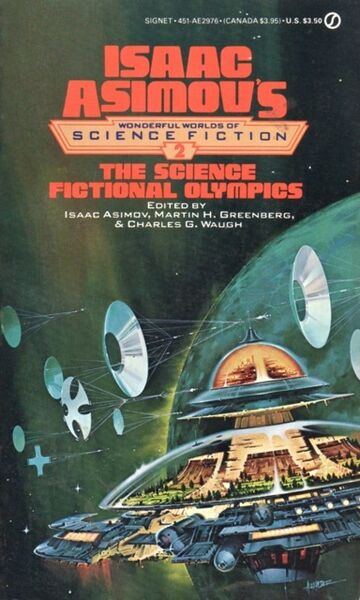Let Me Root, Root, Root for The Home Team
The Science Fictional Olympics (Isaac Asimov’s Wonderful Worlds of Science Fiction, volume 2)
By Isaac Asimov, Martin H. Greenberg & Charles G. Waugh

1 Apr, 2021
1984’s The Science Fictional Olympics is the second anthology in a ten-volume series, Isaac Asimov’s Wonderful Worlds of Science Fiction. Editors: Isaac Asimov, Martin H. Greenberg, and Charles G. Waugh.
To be blunt, this anthology gives the impression of something assembled in haste to meet a deadline, rather than a thoughtful exploration of the theme. Indeed, a number of the stories appear only distantly connected with the anthology’s ostensible purpose.
Many of the stories are unremarkable and dated. As one might expect of tales of this vintage, some stories are super, super rapey. Remarkably, Martin Greenberg is not one of the offenders in this regard, despite the impression I had that he was contractually obligated to include at least one rape per story. The anthology also manages the trick of being not only short by modern standards but also repetitive.
Still, the book isn’t without a few tales for which I have full-hearted, grudging toleration. The Alan Dean Foster story might have been one inspiration for Steve Jackson Games’ classic Car Wars game. “The Wind from the Sun” is a competent story in which winning is not the most important thing. It’s also one more example of the use of coincidence to rescue an otherwise gloomy plot (as so often seen in SF). Under its original title, “Sunjammer,” it saw print a short month before Poul Anderson’s story of the same name, which also featured solar sailing. “Prose Bowl” made me smile, not a reaction often elicited by Malzberg stories.
Still, considered as a whole I cannot recommend this. Providentially, it is out of print.
Introduction: Competition!• essay by Isaac Asimov
A short, almost perfunctory, essay regarding competition.
Run to Starlight• (1974) • novelette by George R. R. Martin
Integrating aliens into human sports might help paper over hostilities lingering from a bitter war some years earlier … or it might exacerbate them, by strengthening the alien belief that they are immeasurably superior to humans!
This is a cousin to stories like James White’s “The Apprentice.” It’s noteworthy because it does not assume that alien societies are cultural monoliths and that aliens themselves might have individual differences.
“The Mickey Mouse Olympics” • (1979) • short story by Tom Sullivan
The nations of tomorrow embrace genetic engineering, with “hilarious” consequences for the Olympics.
“Dream Fighter” • (1977) • short story by Bob Shaw
A psychic warrior on his way down is offered a chance to win big by throwing a fight he will almost certainly lose in any case. But will his pride allow him to accept?
[Does it ever in stories like this?]
The Kokod Warriors• [Magnus Ridolph] • (1952) • novelette by Jack Vance
Magnus Ridolph is hired to put an end to distasteful betting on alien warfare, a task he pursues with an eye to filling his own purse.
Getting Through University • [Dr. Dillingham] • (1968) • novelette by Piers Anthony
A well-meaning human dentist struggles to pass tests whose nature he has misunderstood.
For the Sake of Grace • [Coyote Jones] • (1969) • novelette by Suzette Haden Elgin
Academic success offers a girl escape from a wildly sexist culture… but only if she happens to be the very best in her class.
The National Pastime • (1973) • novelette by Norman Spinrad
Ambitious promoters find success in a hyper-violent football knock-off that plays to American stereotypes and bigotries.
“A Day for Dying” • (1969) • short story by Charles Nuetzel
A political prisoner, consigned to lethal gladiatorial combat for a crime he did not commit, thinks death is the worst thing he faces. He is wrong.
“The People Trap” • (1968) • short story by Robert Sheckley
On the overcrowded, polluted Earth of tomorrow, the only path to land ownership is through a dangerous competition.
“Why Johnny Can’t Speed” • (1971) • short story by Alan Dean Foster
A grieving father sets out to avenge his son’s death in car-to-car combat.
Nothing in the Rules • (1939) • novelette by L. Sprague de Camp
Determined to win at any cost, an ambitious coach convinces a mermaid to participate in competitive swimming.
“The Olympians” • (1982) • short story by Mike Resnick
Olympic victory underscores human superiority over the lesser races.
The Wind from the Sun • (1964) • novelette by Arthur C. Clarke
Skill and devoted preparation prove insufficient in the face of natural forces. Nevertheless, one solar sailor manages to salvage a kind of victory from the interrupted race.
Prose Bowl• (1979) • novelette by Barry N. Malzberg and Bill Pronzini
What cost triumph in a contest that pits two determined writers against each other for the highest word count?
I feel that there’s a subtext here…
From Downtown at the Buzzer • (1977) • novelette by George Alec Effinger
Enigmatic aliens elect to participate in pick-up basketball games, much to the irritation of the humans they soundly drub.
“A Glint of Gold” • (1980) • short story by Simon Hawke [as by Nicholas V. Yermakov]
Innovative biotechnology is just another weapon in Cold War sports rivalries.
This is basically the same story as “The Mickey Mouse Olympics.”
The Survivor• (1965) • novelette by Walter F. Moudy
Mass warfare being too dangerous in a world of nuclear weapons, international conflict is resolved by deadly combat between small units serving as national champions. Death is likely, while survival has its own cost.
Was Vietnam the first war where the American default image of American veterans was as dangerous beasts unfit for human society?
